Lipoprotein(a)-Lowering Drugs: A Mini Review
DOI:
https://doi.org/10.14740/jocmr6196Keywords:
Apo(a), Antisense oligonucleotide, Estrogen-related drug, Lp(a)-formation inhibitor, siRNA, SupplementAbstract
Lipoprotein(a) (Lp(a)) is a type of lipoprotein consisting of low-density lipoprotein with apoprotein(a) (apo(a)) and is a risk factor for cardiovascular disease (CVD). Lowering Lp(a) levels may improve CVD outcomes, but this has been challenging owing to the unique structure and metabolic pathway of Lp(a). Recently, several new treatments using apo(a)-targeting drugs have been developed to reduce Lp(a) levels. Here, we briefly summarize the treatments, including earlier attempts at reducing Lp(a). Some lipid-lowering drugs can reduce Lp(a) levels in a non-targeted manner; while the effect of statins varies, niacin and proprotein convertase subtilisin/kexin type 9 inhibitors exhibit a reduction of over 20% in Lp(a) levels. Estrogen-related drugs and certain supplements can reduce Lp(a) levels, which may promote a deeper understanding of the modulation of Lp(a) levels. An apo(a) antisense oligonucleotide, small interfering RNAs, and a small molecule Lp(a)-formation inhibitor have recently been developed as promising drugs that specifically reduce Lp(a) levels by approximately 80%. The treatment strategies for Lp(a) are set to be updated, although we are awaiting clinical evidence on the reduction of CVD events by new treatments and the effective threshold for Lp(a) levels for the prevention of CVD.

Published
Issue
Section
License
Copyright (c) 2025 The authors

This work is licensed under a Creative Commons Attribution-NonCommercial 4.0 International License.








